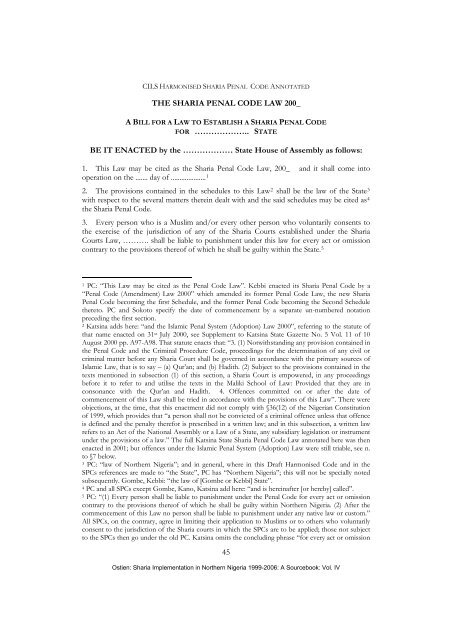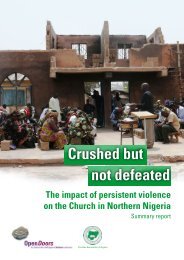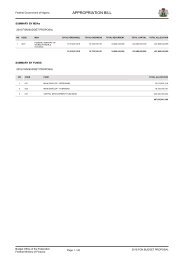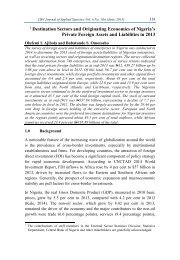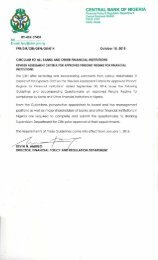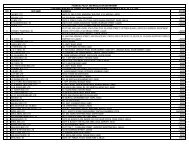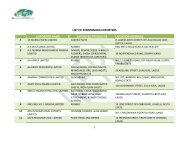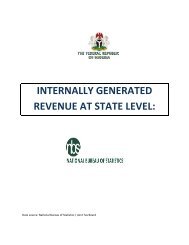vol_4_4_chapter_4_part_III
vol_4_4_chapter_4_part_III
vol_4_4_chapter_4_part_III
Create successful ePaper yourself
Turn your PDF publications into a flip-book with our unique Google optimized e-Paper software.
CILS HARMONISED SHARIA PENAL CODE ANNOTATED<br />
THE SHARIA PENAL CODE LAW 200_<br />
A BILL FOR A LAW TO ESTABLISH A SHARIA PENAL CODE<br />
FOR ……………….. STATE<br />
BE IT ENACTED by the ……………… State House of Assembly as follows:<br />
1. This Law may be cited as the Sharia Penal Code Law, 200_ and it shall come into<br />
operation on the ....... day of .................... 1<br />
2. The provisions contained in the schedules to this Law 2 shall be the law of the State 3<br />
with respect to the several matters therein dealt with and the said schedules may be cited as 4<br />
the Sharia Penal Code.<br />
3. Every person who is a Muslim and/or every other person who <strong>vol</strong>untarily consents to<br />
the exercise of the jurisdiction of any of the Sharia Courts established under the Sharia<br />
Courts Law, ………. shall be liable to punishment under this law for every act or omission<br />
contrary to the provisions thereof of which he shall be guilty within the State. 5<br />
1 PC: “This Law may be cited as the Penal Code Law”. Kebbi enacted its Sharia Penal Code by a<br />
“Penal Code (Amendment) Law 2000” which amended its former Penal Code Law, the new Sharia<br />
Penal Code becoming the first Schedule, and the former Penal Code becoming the Second Schedule<br />
thereto. PC and Sokoto specify the date of commencement by a separate un-numbered notation<br />
preceding the first section.<br />
2 Katsina adds here: “and the Islamic Penal System (Adoption) Law 2000”, referring to the statute of<br />
that name enacted on 31 st July 2000, see Supplement to Katsina State Gazette No. 5 Vol. 11 of 10<br />
August 2000 pp. A97-A98. That statute enacts that: “3. (1) Notwithstanding any provision contained in<br />
the Penal Code and the Criminal Procedure Code, proceedings for the determination of any civil or<br />
criminal matter before any Sharia Court shall be governed in accordance with the primary sources of<br />
Islamic Law, that is to say – (a) Qur’an; and (b) Hadith. (2) Subject to the provisions contained in the<br />
texts mentioned in subsection (1) of this section, a Sharia Court is empowered, in any proceedings<br />
before it to refer to and utilise the texts in the Maliki School of Law: Provided that they are in<br />
consonance with the Qur’an and Hadith. 4. Offences committed on or after the date of<br />
commencement of this Law shall be tried in accordance with the provisions of this Law”. There were<br />
objections, at the time, that this enactment did not comply with §36(12) of the Nigerian Constitution<br />
of 1999, which provides that “a person shall not be convicted of a criminal offence unless that offence<br />
is defined and the penalty therefor is prescribed in a written law; and in this subsection, a written law<br />
refers to an Act of the National Assembly or a Law of a State, any subsidiary legislation or instrument<br />
under the provisions of a law.” The full Katsina State Sharia Penal Code Law annotated here was then<br />
enacted in 2001; but offences under the Islamic Penal System (Adoption) Law were still triable, see n.<br />
to §7 below.<br />
3 PC: “law of Northern Nigeria”; and in general, where in this Draft Harmonised Code and in the<br />
SPCs references are made to “the State”, PC has “Northern Nigeria”; this will not be specially noted<br />
subsequently. Gombe, Kebbi: “the law of [Gombe or Kebbi] State”.<br />
4 PC and all SPCs except Gombe, Kano, Katsina add here: “and is hereinafter [or hereby] called”.<br />
5 PC: “(1) Every person shall be liable to punishment under the Penal Code for every act or omission<br />
contrary to the provisions thereof of which he shall be guilty within Northern Nigeria. (2) After the<br />
commencement of this Law no person shall be liable to punishment under any native law or custom.”<br />
All SPCs, on the contrary, agree in limiting their application to Muslims or to others who <strong>vol</strong>untarily<br />
consent to the jurisdiction of the Sharia courts in which the SPCs are to be applied; those not subject<br />
to the SPCs then go under the old PC. Katsina omits the concluding phrase “for every act or omission<br />
45


